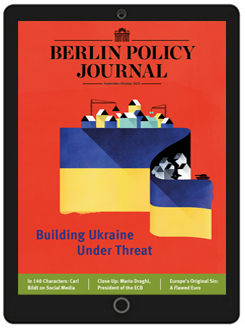Think that a “Merkel doctrine” is an oxymoron? Wrong: Ertüchtigung – loosely, “help for self help” – sounds outdated even to German ears, but the concept behind it is useful today.
Whenever senior German officials explain their vision for Berlin’s expanded foreign policy responsibility, the word Ertüchtigung comes up.The term – which, loosely translated, means to strengthen, toughen up, or optimize – was introduced to the foreign policy debate by Chancellor Angela Merkel in 2011. Later defined by Der Spiegel magazine as the “Merkel Doctrine”, Ertüchtigung has a winning sound to German ears.
Confusion about an “Ertüchtigungs–Doktrin” sets in quickly, though. For those without an ear for German, the term Ertüchtigung is a complicated term twice over. It’s difficult to pronounce (another one of those Umlaut-U words) and difficult to contextualize. Germans, for that matter, might think of the craze in 1970s West Germany for keep-fit forest trails, devised in the run-up to the Munich Olympic Games of 1972. Or even associate such an old-fashioned term with Friedrich Ludwig Jahn (1778–1852) – better known as “Turnvater Jahn”, Germany’s founding father of sport in the 19th century and a fervent nationalist, Jahn meant to keep German youth fit, not least for the wars against Napoleon Bonaparte. One might therefeore be forgiven for asking: Does “foreign policy responsibility” mean sending sports teachers to Afghanistan?
Far from it. Behind the term is a German proposal to assist partners in global trouble spots who show a readiness to engage in regional security themselves. The idea is that Germany should not intervene all over the world directly, but rather train and arm trustworthy partners, if necessary with (German) arms exports. In security policy terms, Ertüchtigung aims at helping countries help themselves.
Sadly, this German policy has already led to misunderstandings. During the Mali conflict, for instance, the French misunderstood the policy as an unfair division of labor. While France engaged in active military intervention to prevent a further advancement of Islamist groups, Ertüchtigung sounded to French ears like Germany trying to have its cake and eat it, too: by merely training Malian soldiers to assume security for their own country.
German left-wingers have difficulties comprehending or coming to terms with Ertüchtigung, too. They see it – falsely – as nothing more than a pseudonym for delivering German weapons to crisis countries along with a push for greater global power. In their view, tanks for Saudi Arabia, frigates for Algeria, and Milan missiles for the Kurds are proof that Berlin is trying to revive the Kaiser’s imperialist policy: “Am deutschen Wesen soll die Welt genesen“ – the world would benefit from the German way of doing things, this time in the form of arms exports.
Despite differences, both the sporting and security policy meanings of Ertüchtigung, both Merkel’s “doctrine” and West Germany’s “keep fit trails”, have one insight in common: an early investment in health is preferable to eventually landing in hospital. After all, timely training of regional partners to prevent conflict breaking out would obviate the need to send in NATO troops on first aid missions. Of course, the right choice of partner is as crucial for today’s Ertüchtigung security policy as it was during the keep-fit Ertüchtigung craze.
Then, as now, it’s better to plan carefully who you sign up with on an Ertüchtigung mission ahead of time. Just as no one would expect their frail grandparents to do pull-ups in the forest, crisis regions, with their authoritarian regimes, weak state structures, and illiberal societies are rather badly qualified for that kind of teaming-up. Neither is one of the key ideas behind Germany’s keep-fit trails – namely, to bring as little equipment, beyond one’s own kit, into the forest – advisable. As modern sports people know, good equipment is decisive for success. In Mali, we saw the opposite: African soldiers had to bring with them everything that they needed for their training in a country where bedding, fuel, weapons, and munition are in short supply.
And so, for its part, Berlin recognizes that the better-off training partner should pay for the equipment, and has already created a special new budgetary item to help out trustworthy partners with equipment and materials.
Despite its ambiguity, Berlin’s Ertüchtigung efforts are neither a German arms export program nor an attempt to wriggle out of responsibility, let alone a new wave of German megalomania.
The policy of Ertüchtigung – thought through to the end, and implemented consistently – raises the promise of an earlier, more decisive, and substantial engagement from Berlin than in the past. For this to work, however, the measures must be grounded in a long-term and sustainable fashion, and must serve crisis prevention.
Making Ertüchtigung work means Germany must play the long game and show strategic patience with training partners. In case a training partner collapses, Ertüchtigung would require Germany providing the correct treatment, and standing by the patient until they are back on their own feet.
Read more articles in the Berlin Policy Journal App – September/October 2015 issue.








